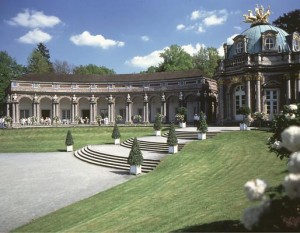Bayreuth – A city of Art and Culture
Bayreuth is a city well known for its association with Richard Wagner. But whilst Wagner brought international fame to Bayreuth through his music and opera compositions, and continues to attract visitors to Bayreuth through the annual Richard Wagner Festival, this northern Bavarian city owes much of its beautiful Baroque buildings, parks and other monumental treasures to Princess Wilhelmine of Bayreuth.
Walk around town and you’ll see the city’s main sightseeing attractions include buildings that have been commissioned by Princess Wilhelmine and her husband such as:
- Margravial Opera House – considered to be the most beautifully preserved Baroque opera house in Europe.
- New Palace – This was the residence of the Margraves with features like the Garden Room, the Cedar Room, the Music Room and the famous Cabinet of Fragmented Mirrors. The amazing fact about this Palace is that it was built in just two years.
- Eremitage – the Old Palace
- Bayreuth University
Bayreuth Prospered during the Margrave Reign
Bayreuth is believed to have been founded by the Counts of Andechs in the Middle Ages. The city’s early history was volatile and marked by wars, epidemics, destruction and fires. The beginning of the reign of Margrave Christian was the turning point in Bayreuth’s history especially when Christian moved his royal seat from Kulmbach to Bayreuth.

Margravial Opera House – Courtesy GNTB
It was during the Margrave Friedrich and Wilhelmine’s reign that Bayreuth flourished. When Wilhelmine, the oldest daughter of the Prussian King Frederick Wilhelm I, was married to Crown Prince Friedrich of Bayreuth in 1731, she was unhappy at being away from the grander environment that she was accustomed to. She went about pouring her energy into creating a leisure court that matched her brother’s (Frederick the Great) court in Potsdam.
Wilhelmine loved art and she was also interested in music, literature, building and landscape. The Margrave Friedrich was himself a cultivated and educated prince of the Enlightenment and between them they called on artists from all trades to come to the Court.
In 1735 Wilhelmine redesigned the expansion of the Eremitage, her favourite place. In 1742 Margrave Friedrich founded the university in Bayreuth. In 1744 the Margravial Opera House was built followed by the New Palace in 1754. Wilhelmine also encouraged members of the Court and citizens to construct new buildings, resulting in Bayreuth have a good number of private residences dating to that period that are worth seeing. During its heyday, Bayreuth was famous as one of the most magnificent royal seats in Germany.
Bayreuth Today
Bayreuth today is a modern university town with an international reputation as a cultural capital. Apart from the Richard Wagner Festival (Bayreuther Festspiele), there are concerts, operas, musicals and plays happening in the city the whole year round. In this city, there are some 25 museums covering art, history, Richard Wagner and the history of the Wagner Festival, a museum dedicated to Franz Liszt (father-in-law of Richard Wagner), a typewriter museum, a fire brigade museum and much more.
Bayreuth is also a popular conference and convention city. It is also one of the towns along Germany’s famous Castle Road, making it a destination that should not be missed.
Search and book classical concerts and operas in Bayreuth
Search and book hotels in Bayreuth
For more Bayreuth Info, see HERE
Bayreuth Map
Germany


 Take Better Digital Photos eBook
Take Better Digital Photos eBook Guerrilla Travel Photography eBook
Guerrilla Travel Photography eBook
Leave a Reply